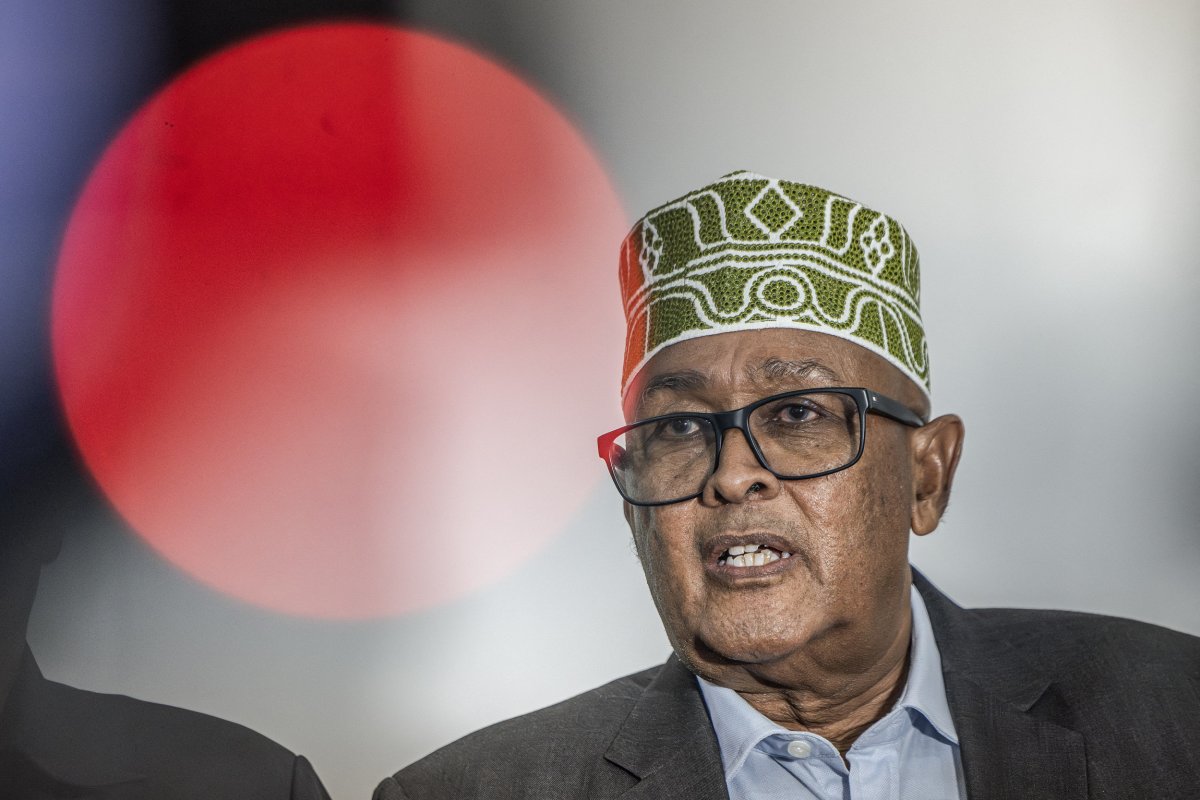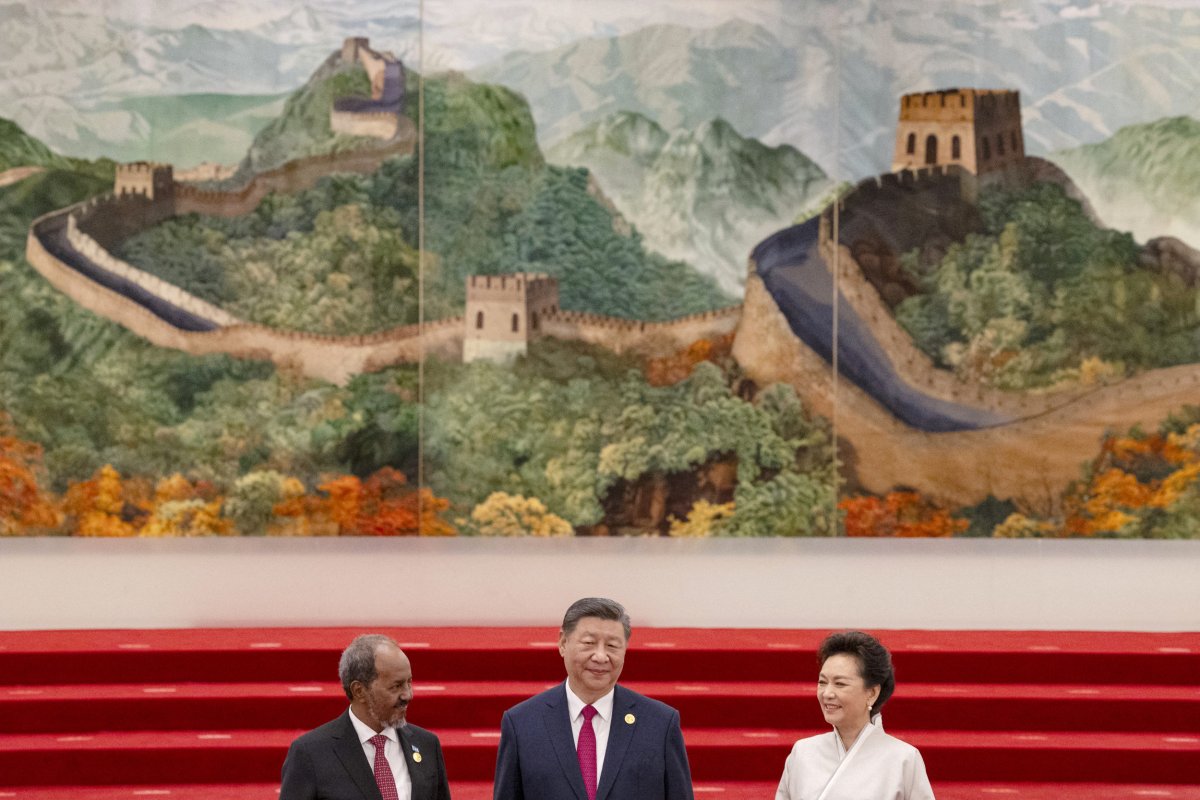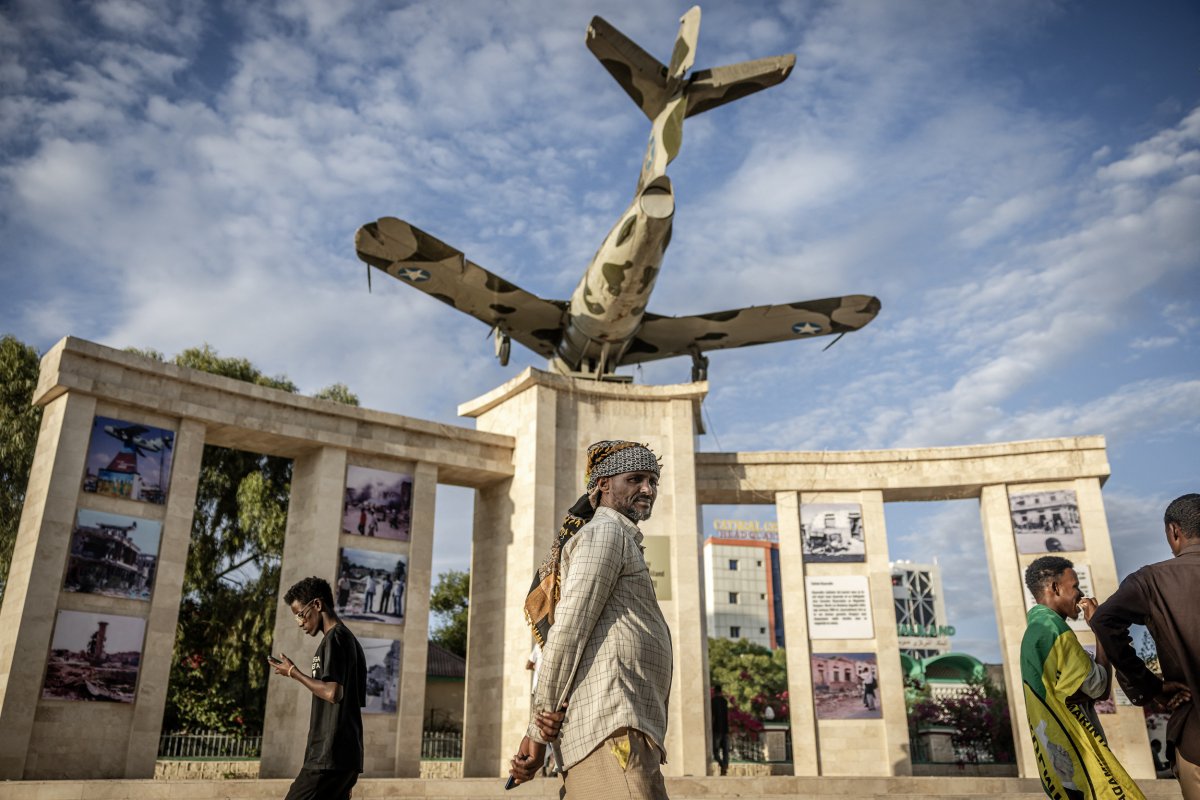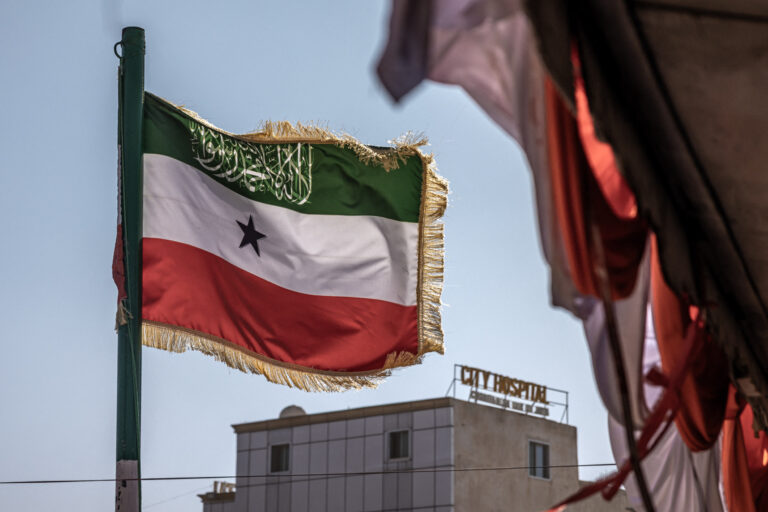On the Horn of Africa, at the strategic point where the Gulf of Aden meets the Red Sea, lies an enthusiastic partner willing to host U.S. military bases and allow access to critical resources at a time of growing competition between the United States and China.
The only problem: the U.S., like every other country in the world, views Somaliland as part of Somalia.
“The United States recognizes the sovereignty and territorial integrity of the Federal Republic of Somalia, which includes the territory of Somaliland,” a U.S. State Department spokesperson told Newsweek.
“The State Department is not in active discussions with Somaliland’s representatives about a deal to recognize Somaliland as a state,” the spokesperson added.
But such statements have yet to crush the hopes of advocates such as Bashir Goth, who serves as Somaliland’s representative to the U.S.
“While I cannot speculate on the deliberations within the United States government, there has been growing concern about the failure of the ‘One Somalia’ policy to produce a central government in Mogadishu that can stand on its own two feet, as well as interest among U.S. policymakers in exploring alternative approaches to the region,” Goth told Newsweek.
“Somaliland looks forward to continuing its constructive, pragmatic conversations with U.S. officials about the future of our bilateral relationship,” he added.

LUIS TATO/AFP/Getty Images
Historical Grievances
As with many sovereignty disputes across the globe, the feud over Somaliland’s status is rooted in colonialism. The United Kingdom first established the protectorate of British Somaliland in the late 19th century, followed by Italy’s colonization to the south of Italian Somaliland in much of the rest of what is known today as the Federal State of Somalia.
Italian Somaliland was placed under British military administration after Italy’s World War II defeat in 1941, and in 1950 became a United Nations trust territory administered by Italy until independence in 1960. British Somaliland gained its independence that same year, but just days later voluntarily opted to join a unified, free Somali state in union with the former Italian Somaliland.
Frictions would arise, however, amplified with the 1969 coup in which military leader Siad Barre established communist rule, met by an insurgency backed by the Somali National Movement, which drew support from the Somaliland region. Upon the collapse of Barre’s government in 1991, Somaliland proclaimed independence, operating largely autonomously from the central government in Mogadishu, which remained in a state of civil war.
Another autonomous state, Puntland, would emerge as an autonomous state in 1998 next to Somaliland, though it does not seek outright independence from Somalia.
Today, Somaliland looks to portray itself as a bastion of democracy and stability at a time when other regions of Somalia are plagued by violence perpetrated by the likes of the Al-Qaeda-affiliated Al-Shabab movement and the Islamic State militant group’s Somalia branch.
“Somaliland has built a secure, stable, democratic society that provides opportunities for its citizens, is open to foreign investment, and seeks to advance peaceful relations with its neighbors,” Goth said.
He likens historical parallels of Somaliland’s position as part of a united Somalia with the formation and dissolution of other combined states, such as Czechoslovakia, the Senegambia Confederation, the Soviet Union and the United Arab Republic.
Challenging China
Thus far, no U.S. administration has backed Somaliland’s statehood claims, though Washington does host a Somaliland liaison office. Meanwhile, Goth says several other countries, including Denmark, Djibouti, Ethiopia, Turkey, the United Arab Emirates and the United Kingdom maintain diplomatic office in the de facto capital of Hargeisa.
Ethiopia’s position has especially been in the spotlight since the large landlocked nation signed a memorandum of understanding with Somaliland early last year through which the former would consider altering its diplomatic stance in exchange for leasing a 12-mile stretch of coastline.
The move was condemned by Egypt, Eritrea and Somalia, raising regional tensions until a Turkey-brokered agreement in December appeared to curb Ethiopia’s coastal ambitions, though without any explicit renunciation of the deal. The anticipated deal had also drawn criticism from the 55-member African Union and 22-member Arab League, both of which Somalia is a member.
Given the controversy attached to the issue, the official U.S. position has been to the African Union to first deliberate the matter before any policy changes from Washington.
But Somaliland has ramped up efforts to make the case for a change. The campaign includes an appeal to the Trump administration’s search for international partners to compete with China across the globe, and particularly in Africa, where the People’s Republic has established unprecedented influence.
“Somaliland has resisted China’s attempts to expand its presence and influence in Africa and instead has pursued partnerships with the U.S. and Taiwan – formally recognizing the latter in 2020,” Goth said.
Only one internationally recognized African nation, Eswatini, maintains diplomatic ties with Taiwan, which is claimed by China and has lost much of its international recognition to Beijing since a 1949 civil war led to a communist victory on the mainland. Washington does not formally recognize Taipei, either, though it has maintained and expanded upon ties, including through military support.
Somalia’s announcement in April that it would no longer accept travel documents issued by Taiwan was welcomed by China, which lauded Somalia’s “commitment to the one-China principle” and outlined a similar position afforded to Mogadishu by Beijing.
“Somaliland is part of Somalia’s territory,” Chinese Foreign Ministry spokesperson Guo Jiakun told reporters at the time. “China firmly supports the Somali federal government’s effort to safeguard national unification, sovereignty and territorial integrity, and firmly opposes the Taiwan authorities and Somaliland hosting each other’s institution or having any form of official interaction.”
The realities of the U.S.-China competition have also sparked a race for key minerals. Here, too, Goth said Somaliland could prove beneficial.
“Somaliland has also recently discovered high-grade lithium and other critical mineral deposits, like copper and iron ore,” Goth said. “As the U.S. seeks to diversify its critical mineral supply chains away from China-dominated sources, Somaliland represents a potential partner with shared values.”
Newsweek has reached out to the Somali Ministry of Foreign Affairs for comment.

LUIS TATO/AFP/Getty Images
The View from Beijing
Reached for comment, Chinese Embassy to the U.S. spokesperson Liu Pengyu reaffirmed to Newsweek Beijing’s position as voiced by Guo in April, stating “Somaliland is part of Somalia” and “China firmly supports the efforts of the Federal Government of Somalia to safeguard national unity, sovereignty, and territorial integrity.”
Liu also emphasized “that China has always advocated upholding the purposes and principles of the UN Charter and supports all countries in safeguarding their sovereignty and territorial integrity.”
As for the recent inroads between Hargeisa and Taipei, he asserted that “we firmly oppose the establishment of institutions by the Taiwan authorities or any form of official exchanges between the two countries.”
While the U.S. has enjoyed close ties with Somalia since the establishment of the transitional federal government in 2004 and the federal government in 2012, Beijing has also fostered close ties with Mogadishu.
Liu argued that engaging with Africa was not a zero-sum game, saying Beijing would encourage rather than oppose greater U.S. investment across the continent.
“Supporting Africa’s development is the shared responsibility of the international community,” Liu said. “We have always welcomed the diversification of Africa’s cooperation partners and welcome the international community, including the United States, to increase its attention and investment in Africa and engage in truly equal and mutually beneficial cooperation with African countries.”
“We also hope that the United States will approach China-Africa cooperation with an open mind,” he added. “Africa is not an arena for great power games. African countries and people have the wisdom and ability to choose partners that serve their own interests. As long as cooperation is truly beneficial to the African people, it can be self-sustaining and win-win.”

More
ANDRES MARTINEZ CASARES/Pool/AFP/Getty Images
A ‘Model’ for Counterterrorism
Beyond the China front, Goth argued that Somaliland “offers a secure, stable environment” for the U.S. “to counter terrorism throughout the region,” including resisting maritime attacks mounted by Yemen’s Ansar Allah, also known as the Houthi movement, in response to the war between Israel and the Palestinian Hamas movement in the Gaza Strip.
While such attack have subsided since the Trump administration reached a truce with the Iran-aligned group in May, Ansar Allah continues to conduct missile and drone strikes against Israel, raising uncertainties over safety through one of the world’s busiest maritime shipping routes.
Meanwhile, the U.S. has largely turned its attention in the region elsewhere, ramping up strikes targeting Al-Shabab and Islamic State Somalia Province, largely in coordination with Somali authorities.
Many such operations have been conducted by aircraft flying from naval assets in the region, with U.S. personnel present on the ground in Somalia. Also key to the U.S. military presence in the region is the U.S. base in Djibouti, which hosts military facilities owned by China and several other nations as well.
Goth said closer ties between the U.S. and Somaliland would also bolster the effort to route militant groups active in the Horn of Africa and beyond.
“Somaliland’s model for countering extremism and terrorism within its border provide a blueprint for the U.S. to consider in other regions,” Goth said, “while partnering with a democratic government will send an important message to others that building institutions is the best and most sustainable way to contribute to global security.”

Frankie M. Guage/U.S. Navy
Domestic Debate
Support for U.S. recognition of Somaliland has existed within Washington for decades, but a recent uptick has seen influential Republicans in Congress take up the cause.
Senator Ted Cruz of Texas, chair of the Senate Foreign Relations Subcommittee on Africa and Global Health Policy, issued a letter to Trump last month arguing that “Somaliland has emerged as a critical security and diplomatic partner for the United States, helping America advance our national security interests in the Horn of Africa and beyond.”
Urging the U.S. president to grant Somaliland recognition, Cruz argued that the hopeful state’s record in countering “regional terrorism and piracy operations,” while also facing “mounting pressure from adversaries, due in no small part to its role as a partner for the United States and our allies.”
He accused the Communist Party of China of “using economic and diplomatic coercion to punish Somaliland for its support for Taiwan, as well as to undermine that support.”
The letter was welcomed by Somaliland Foreign Minister Abdirahman Dahir Adan, who has organized meetings with Cruz and other U.S. politicians. Somali Ambassador to the U.S. Dahir Hassan Abdi, however, soon after wrote an op-ed for Real Clear World in which he warned of the consequences of recognizing Somaliland independence.
“Endorsing, or imposing, partition in favor of a secessionist movement representing only a small minority would fracture these efforts, complicate intelligence sharing, and weaken the Somali National Army at a moment when unity is most critical in the fight against al-Shabaab and ISIS,” Abdi wrote.
The Somali envoy went on to argue that such a move would, “far from resolving conflict, would reignite and deepen it by hardening political grievances into identity divisions that cannot be bargained away.”
“Beyond Somalia, it would embolden separatist movements across Africa and erode the African Union’s cornerstone principle of preserving post-colonial borders,” Abdi wrotem. “Some cite governance differences as justification, but good administration alone is not a basis for sovereignty—and the disparities between Somali regions are far less stark than often claimed.”
Yet momentum continues among supporters in Washington. Last week, Representatives John Moolenaar of Michigan and Chris Smith of New Jersey, who co-chair the Congressional-Execution Commission on China, sent a letter to Secretary of State Marco Rubio in which they made similar arguments.
Among their asks was that the State Department revise its travel advisory for Somalia, currently listed at the highest threat level of “Do Not Travel,” because “a separate advisory for Somaliland would incentivize U.S. companies and investors to capitalize on its natural resources, including critical minerals such as lithium and copper.”
Legislation calling for U.S. recognition of Somaliland independence has been introduced by other Republicans, including Representatives Scott Perry of Pennsylvania and Andrew Ogles of Tennessee. Senator James Risch of Idaho has also backed a bill for expanding U.S. relations with Somaliland.
Support for Somaliland recognition also found its way into the pages of the Heritage Foundation’s Project 2025 policy document.

LUIS TATO/AFP/Getty Images
‘The Practical Side’
Still, skepticism prevails among many with direct experience in dealing with the issue.
David Shinn, who has served in a number of diplomatic roles in Africa, including as ambassador to Burkina Faso and Ethiopia, acknowledged that Somaliland’s claims did have a basis in international law given its brief preunification independence 65 years ago, though he argued that the realities of the U.S. implementing recognition complicated any policy shift.
“They have a very strong legal argument, no one should be disputing that.” Shinn, now a lecturer at George Washington University’s Elliott School of International Affairs, told Newsweek. “But the question is the practical side of it.”
Shinn warned that, while he agreed Somaliland had made strides in pacifying local conflicts, violence involving ethnic clans “could be spun up fairly quickly if they were so inclined,” putting a strain on both Somali and Somaliland security forces.
And while Somalia’s central government has struggled in its own long-standing endeavor to stamp out insurgency elsewhere in the country, Shinn felt alienating Mogadishu may only exacerbate the nation’s security woes while simultaneously garnering blowback from other African nations.
“The biggest downside to all of this, to recognizing [Somaliland], would be, one, you would really have a troubled situation in terms of our relationship with Mogadishu,” Shinn said. “We have a pretty close relationship with Mogadishu, including providing military support for trying to combat Al-Shabab in Somalia. It would complicate that arrangement. Needless to say, it wouldn’t necessarily end it or anything, but it would certainly make matters difficult.
“It would also raise issues in terms of the African Union, and just those African countries that are not prepared to provide any diplomatic recognition of Somaliland,” he added.
Shinn also expressed the belief that a number of selling points to granting Somaliland recognition, including shoring up the U.S. stance against China and opening up newfound resources, “are often overstated,” even if they might afford some “short-term advantage.”
“I’m sympathetic to the Somalilanders, but I just don’t see that it’s in the U.S. national interest at this point in time to be the first to formally recognize,” he said. “I think that there would be more downsides than upsides.”


